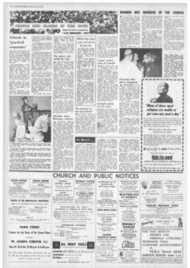Page 6, 10th June 1966
Page 6

Report an error
Noticed an error on this page?If you've noticed an error in this article please click here to report it.
Tags
Share
Related articles
Edmund Gosse Called Him
In A Few Words
Television And Rain
"chastity, My Brother" : "parnell" "ballets De Monte...
Cats, Correspondents And Quixote
So is poetry only for the young?
GOOD, MEDIUM AND BAD VERSE
SMALL WONDER so few people are interested in poetry. Out of more than a dozen books published in the same few weeks more than half are worthless, and two or three others are not very interesting.
But the good books, if you can find them, and more important the good poems really say something extraordinary. They speak about human life as intimately as a film, but truthfully, as physically as breath, but coherently, and as deeply as all those popular fantasies (coronations, harvests, liturgies) which are really universal human projections, but with sobriety, openness and force.
The best poems in W. H. Auden's About the House (Faber, 15s.) are particularly absorbing because of their personal quality: their strange complications, their barren patches and their compelling charm are simply a reflection of Auden's personality.
On a different poetic scale, Karen Gershon has also written some fine poetry which is in a way more serious than Auden's, and almost as obsessively personal. From her Selected Poems (Gollancz, 18s.) I choose "Kaddish", a powerful poem for dead Jews.
There are some marvellously strong but less obsessive poems in Cages by Ruth Fainlight (Macmillan, 18s.). Her poems are a relief to read after a good deal of modern poetry because they are all completely unfaked, as a result they have a certainty and a truth to music which are a hallmark of the best poetry being written today. Perhaps after all poetry is for young people; no one else can face this degree of realism and the breaking open of so many horizons.
Does it need a cavernous intellectual appetite to take the full impact of a towering modern poet like Randall Jarrell? His posthumous book, The Lost World (Eyre & Spottiswoode, 18s.), has poems in it which both demand and occupy a wider, deeper attention even than Auden. It is hard to come to terms with this book. The poems are easy on the surface, but their souls are like ominous bronze figures. There exists adegree of greatness of which they fall short —the bronze in a way is faulty— but the need to read them does not dry up easily. There is another book just out which in a purer form than any other book published in these weeks expresses the situation of someone who wants simply to be a poet. Brian Higgins, who died last December, had a real and even brilliant talent for light verse; he was honest, but the humour was black, and there were levels of acceptance and understanding that he never reached. He was a doomed minor poet, of whom there are many. His book, The Northern Fiddler (Methuen, 15s.), speaks directly to anyone who knows that terrible treadmill.
My immediate personal favourite among the poems of these weeks (leaving out Auden about whom one's feelings are powerful but mixed) is George Barker's free version of the Stabat Mater, and the book of poems I got the best pleasure from was his Dreams of a Summer Night (Faber, 18s.). Barker and Auden are masters, the other poets are interesting to a high degree, but in the end the poems to go for are the possible materpieces, which means a handful of poems by Auden and Barker.
There is one other book by a masterly poet, Elizabeth Jennings, The Secret Brother (Macmillan, I6s.), a book of most interesting poems for childen, in which I liked best of all the one she herself wrote as a child.
Peter Levi, SJ.
blog comments powered by Disqus











